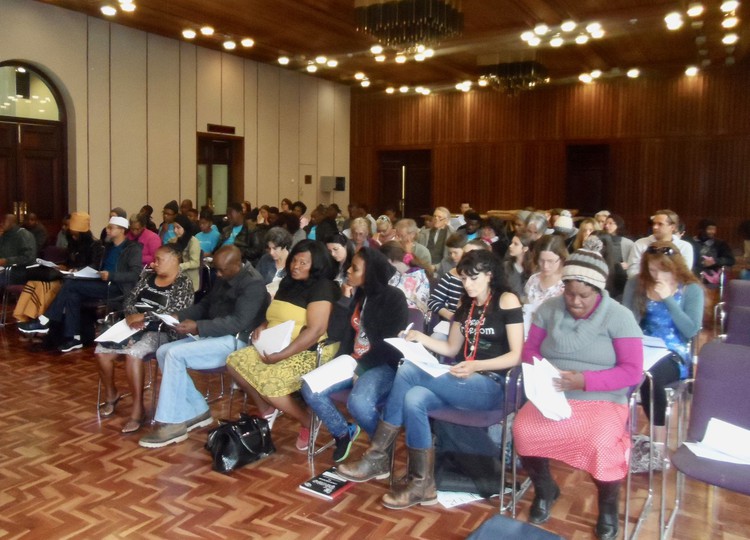
A public hearing on the Plant Improvement Bill and the Plant Breeders’ Rights Bill was held in the Port Elizabeth City Hall on Friday. Photo: Joseph Chirume
26 September 2017
“Seed is something that is sacred. Seed is life. In our tradition, it is about culture, identity; it’s about sharing … If everything is for sale, when will it stop?” asked Rifqah Tifloen at a public hearing on the Plant Improvement Bill and the Plant Breeders’ Rights Bill in Port Elizabeth’s City Hall on Friday.
Tifloen of Calabash Trust was making a submission on two bills introduced in the National Assembly and published in the Government Gazette on 23 January 2015. The Plant Improvement Bill and the Plant Breeders’ Rights Bill will replace the Plant Improvement Act (1976) and the Plant Breeders’ Rights Act (1976).
The bills seek among other things to regulate the quality, import and export of plants and to protect the ownership rights and royalties of plant breeders.
Tifloen believes the bills will harm small scale farmers. “Seed production and distribution should be made accessible to the poor. These two bills, if made into Law, will subvert food production and food security. We want bills that protect farmers’ rights and not one’s that enable policing of farmers. We want policies that support food sovereignty because all people have a constitutional right to food,” she said.
A written submission by the African Centre for Biodiversity says the new bills will strengthen the rights of breeders and weaken those of farmers. “Breeders rights should extend only to the first purchase of the seed. Following this, farmers should be allowed to freely save, trade, and exchange and sell all materials that are under their control and in their seed system.”
A backyard gardener and nursery trader, Robert Matsabise of Wells Estate, said, “We are forced to depart from our traditional way of owning and distributing seed. They [the bills] destroy the concept of Vuk’uzenzele. The bills take away our freedom of cultivation and experimentation because we are always afraid of being arrested if we flout the law.”
Mangaliso Ngxokwana, 75, of KwaZakhele, said he has been practicing farming in the backyard of his house and at a nearby school for many decades. “I inherited my farming practices and skills from my parents long before these breeding companies arrived in this country. Now they want to own the seeds that we inherited. It is even very expensive to register ownership of the seeds. The process is just laborious and expensive for us. It favours the rich.”
Rushta Johnson, a small scale farmer and environment activist based in Port Elizabeth, said, “Yes, it costs money to breed. The rich corporates have the money … As farmers we share and exchange our seeds. With these Bills, it will be a criminal offence to do so … This means if you want to sell your seeds you need to register first.”
A university student, Ribekah-Breeze Johnson, said, “We risk losing our indigenous seed varieties when big corporations push for farmers to use one variety … Even though these two bills seem small, I can’t help seeing the bigger picture and what destruction they [as they are now] could lead to in the future.”
Advocate Koleka Beja for the Eastern Cape Legislature told the audience that her committee would consider the people’s sentiments. She said: “These are strong sentiments. You are the ones who should give the nod whether it will be passed or not. I will take your submissions as they are because they are coming from the people affected by the bills.”